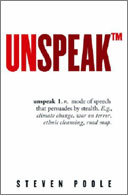
Unspeak
by Steven Poole
Little, Brown £9.99, pp280
When military commanders draw up their plans, they assume they will be going into battle against armies. They do not usually factor in the threat from abstract nouns. Politicians, on the other hand, know better, which is how we ended up fighting a 'war on terror'. To the soldier, this is ridiculous. 'Terror' cannot sign treaties. It cannot surrender. But that is what makes it so attractive to the politician. The language of war is used to smuggle all sorts of extreme measures - detention without trial, torture, military aggression abroad - into what is really a time of peace.
This is 'unspeak', a word that Steven Poole has coined to describe those terms that have crept into our everyday language with political spin built in. 'War on terror' is an American import, but we have homegrown unspeak too. 'Antisocial behaviour' is a good one. Everybody seems to know what it is without it ever having been defined. We know, for example, that hooded youths loitering in an intimidating fashion on poorly lit street corners is 'antisocial behaviour'. But, as Poole points out, when young people congregate like this, they are, in fact, exhibiting very social behaviour, only in a manner that is politically awkward. They are not breaking the law or, at least, not until they are subject to an Asbo. Then, if they continue to act 'antisocially', they can be imprisoned. It is normally dictatorships and theocracies that legislate so intrusively on what a society deems good public conduct.
Totalitarian habits peep out wherever Poole breaks the crust of political jargon. The great 20th-century dictators knew as well as modern political spin doctors that the expression of truth depends on language. Control the words and you control the truth. Orwell knew this too. 'Unspeak' is the modern cousin of Big Brother's newspeak in Nineteen Eighty-Four.
Journalists, in particular, risk pushing a partisan agenda by carelessly importing the terms that politicians would prefer they use; 'extraordinary rendition' instead of 'kidnap and torture', for example. Poole charts the stealthy legitimisation of 'ethnic cleansing', which started out as a term liked by the perpetrators of genocide because it hid their crimes in a metaphor of hygiene. By dropping the inverted commas, we adopted the murderers' point of view. We do not, by contrast, ever refer to the Holocaust as 'the final solution to the Jewish question'.
Poole's archaeology of everyday terms is impressive and salutary, but it is too pessimistic. Not every metaphor is meant to trick. He cites politicians' overuse of the word 'tragedy' as a sign that they want bad events to be seen as acts of God, not their incompetence. But it is more likely politicians just abuse the word in much the same way that football commentators misuse it when they describe a team's 'tragic' exit from the cup. No less irritating, but not sinister.
It is also possible for horrible truth to be stronger than euphemism. A 'purge' used to be positive - the expulsion of something toxic. That is why Stalin borrowed the image to describe his massacre of party members. But the enormity of the crime changed the word, not the other way around. No one would announce a management shake-up or a corporate downshift or a cabinet reshuffle these days by saying they plan to have a 'purge'.
There is no doubt that unspeak is among us and that we must guard against it. But we should also allow ourselves a little faith that the truth shines through in the end.

